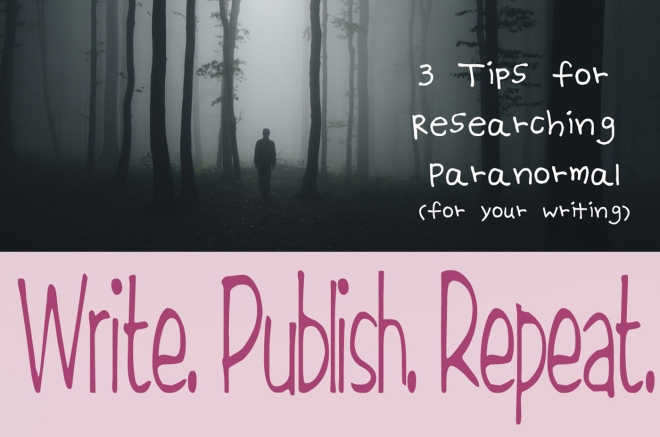For Halloween, I decided a paranormal themed podcast was in order! Read the transcript or listen to the podcast for tips on researching paranormal for your writing and incorporating what you learn into your story.
The blending of fiction genres has led to a variety of paranormal subgenres, from paranormal romance to paranormal military fiction. Readers love paranormal fiction, but they expect it to be either factual or wholly unique. Now, when talking about factual paranormal fiction, what do I mean? I mean researching the common theories, terms, mythos, and culture. Writing paranormal may sound as easy as throwing in a few ghosts or vampires. Writing paranormal that truly draws in readers takes a little more than that. Today I’ll discuss how to research paranormal and incorporate what you learn into a convincing story that will capture reader’s attention.
Research
How do you find reliable information on your chosen paranormal topic? That’s a tough question, because when you type “ghosts” into a search bar, you’ll get anything and everything. There are two important aspects of researching the paranormal for a work of fiction.
First: You’re not looking for a scientifically proven set of facts. You’re looking for the general consensus among a community of believers. What are the hallmarks of belief in ghosts? What do most accept as standard and what are the outlier theories? What is dismissed outright? Talk to people who actually believe and participate in the culture. It’s important to understand the core beliefs of a paranormal topic in order to ground your story in the basics. Then you can take it where you will.
Second: Learn the culture. Given that I’ve been working of The Ghost Host: Episode 2 lately, I’ve been researching ghosts, ghost hunting, and concepts of the soul and afterlife. Even though Echo doesn’t need as many physical tools as the average ghost hunter who can’t see ghosts, it’s important that she knows what others are using to confirm her talents and explore their own paranormal experiences. I need to know about EMF, EVP, protocol for séances, what herbs are involved in ritual cleansings, and more. Know the terminology, tools, and implements of your topic so your character can convincingly belong to that world.
Applying what you’ve learned
The tough part of research is that you learn thousand things when you only needed to know about one. A mistake writers sometimes make is trying to cram everything they learned into their book. Just because a reader is interested in ghosts doesn’t mean they want a chemical breakdown of why salt disrupts spiritual energy.
When incorporating your research into your stories there are two questions to ask:
Is this integral to the plot? If it is, blend your research into the story as needed. Don’t info dump. Give the reader only what they need to know in each scene in order for them to suspend disbelief and stay involved in the story. Add research as you would leave pieces of a breadcrumb trail: Just enough to follow along.
The next question you want to ask is: Will this help create a believable setting or world? In The Ghost Host, I mention that one of the characters sleeps with a hex bag under his bed. Other than a brief mention of what “might” be included in a hex bag, I don’t go into any more detail. The story itself doesn’t deal with hex bags. I used it only to add to Kyran’s character and illustrate that he comes from a family who believes in the occult and doesn’t think twice about what others would consider odd.
If a bit of research doesn’t enhance the story or help with world building, save it for something else.
Suspend your own disbelief
Writing paranormal fiction, by its very nature, requires authors to write in a way that convinces readers to put aside typical logic and science and accept the unexplainable as fact. You can’t convincingly do that unless you as the writer can do the same thing. Now, just because you write about vampires doesn’t mean you have to believe in them. You do, however, need to believe they could exist in the world you’ve created in order to convince a reader to believe.
This requires the paranormal aspects of your story to hold equal weight with the plot and characters. A brief mention of one character believing in something paranormal during the course of plot and character development doesn’t constitute a complex blending of story and paranormal. If the main resolution of the story hinges on the paranormal, it can’t come as a surprise to the reader. No one likes to get involved in a coming of age story only to have a horde of ghosts jump out at the end to resolve some critical plot point. Trust me, it happens.
Even in “The Sixth Sense” where the twist is that Bruce Willis is in fact a ghost, the entire storyline revolved around the viewer believing that ghosts are real and involve themselves in the world of the living. Had there been absolutely no mention of the paranormal and the story focused only on a young boy receiving counseling for behavior issues, only to have Willis suddenly figure out he’s a ghost with unresolved issues and the boy knew it the whole time, would have been confusing at the least.
Just as when an author researches another culture, specific location, scientific breakthrough, or historical event, due diligence is required in order to fully capture what they are researching. There are many people around the world who believe in the paranormal. If you intend to write an authentic account of someone experiencing paranormal phenomena, treat it the same way you would write about anything else. Your fiction may be someone else’s real beliefs, and they’ll spot lazy or halfhearted work a mile away.

